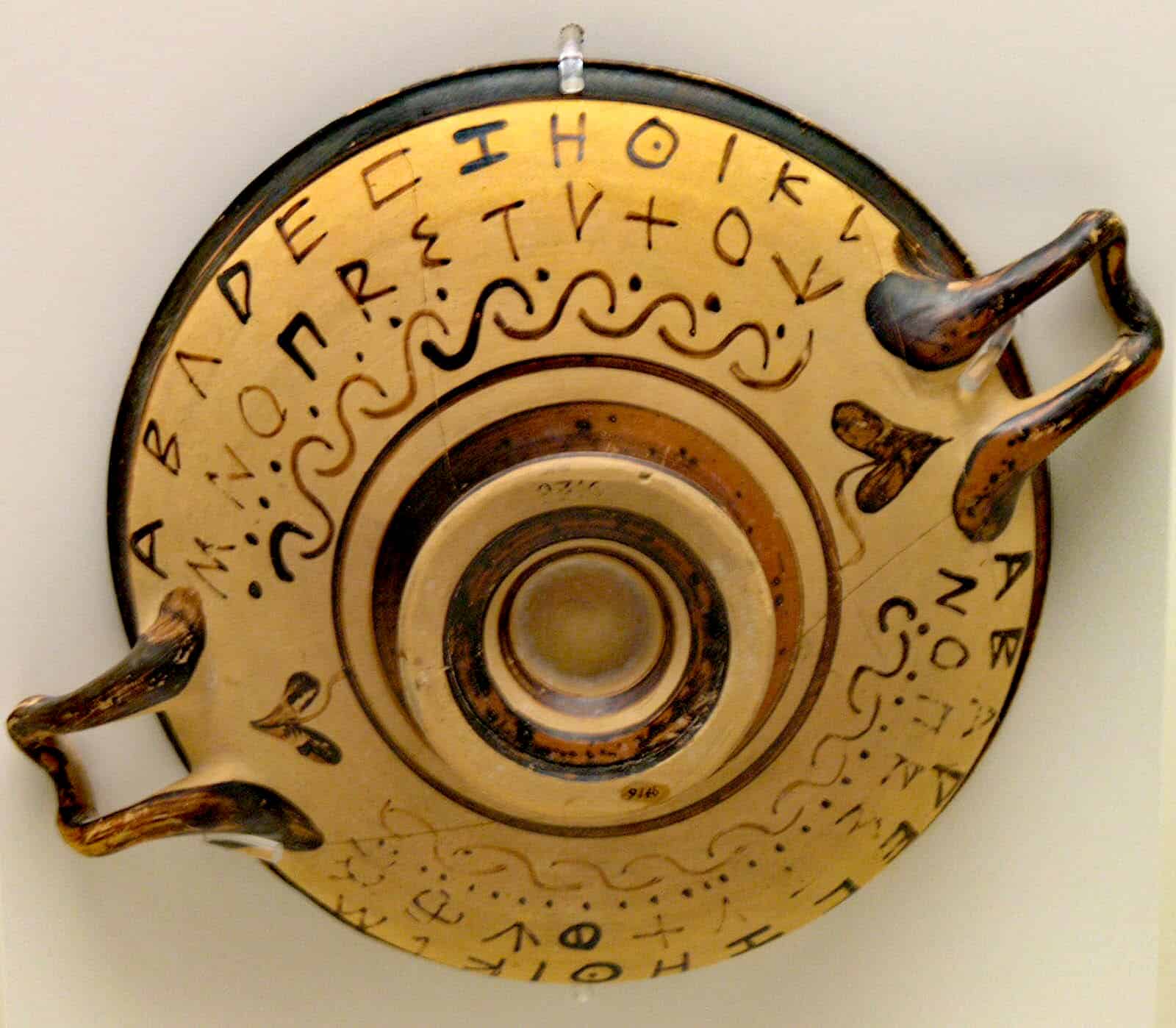

The alphabet was one of the most important and influential things created in ancient Greece. It enabled ideas, which the Greeks famously had many, to be written down and shared easily. This alphabet also led directly to the Latin alphabet, used by most of the West today. What was the origin of the Greek alphabet?
To begin, it seems most appropriate to see what the ancient Greeks themselves had to say about the origin of their alphabet. The earliest surviving record on this is from Herodotus, a Greek historian writing in the mid-fifth century BCE. He wrote:
“These Phoenicians who came with Cadmus and of whom the Gephyraeans were a part brought with them to Hellas, among many other kinds of learning, the alphabet, which had been unknown before this, I think, to the Greeks.”
As we can see, Herodotus believed that writing was introduced to Greece by the Phoenicians who came to the country with Cadmus. The latter was a prince from Tyre in ancient Phoenicia.
Herodotus was evidently unaware of the practices of the Mycenaean Era, in which the Greeks wrote using Linear B.

Linear B tablet. Credit: Sharon Mollerus / CC BY 2.0 / Wikimedia CommonsThe Bronze Age Greeks mostly used Linear B for administrative purposes. At the end of the Mycenaean Era, during the Bronze Age Collapse of the 12th century BCE, the use of Linear B was abandoned. During much of the subsequent Greek Dark Ages, writing was no longer practiced — or at least, no evidence of it has been found. This absence has led scholars to believe that writing had been lost entirely during this time. As a result, Linear B did not evolve into the later Greek alphabet — the two systems were separate in origin and structure.
Nevertheless, the Phoenician-derived Greek alphabet may well ultimately share an origin with Linear B. We know that Linear B evolved directly from the Linear A of the Minoans.
Significantly, many scholars believe that Linear B was directly inspired by Egyptian hieroglyphs. The Phoenician alphabet, for its part, also derives from Egyptian hieroglyphs, although through a completely different route.

According to Herodotus in The Histories 2.145, the origin of the Greek alphabet should be dated to Cadmus, who, he claims, lived about 1600 years before his era, because Herodotus was writing around 450 BCE, which places Cadmus at approximately 2000 BCE.
However, there are some serious problems with this. For one thing, there are many instances where Herodotus demonstrably exaggerated certain periods. For example, he placed Pharaoh Shabaka in c. 1200 BCE, despite him living in c. 700 BCE.
Therefore, we would do well to take Herodotus’ claim with a grain of salt. We know that Herodotus’ claim cannot be correct, since the Phoenician alphabet did not exist as early as 2000 BCE. At that time, the Greeks had not even started using their first script, Linear B.
Interestingly, Herodotus reveals that his estimate for the origin of the Greek alphabet is exaggerated. In The Histories 4.147, he places just six generations, or less than two centuries, between Cadmus and the Trojan War, which, for its part, is usually dated to 1200 BCE, although some scholars place it more recently.
We can only get so far by using Herodotus’ account of the origin of the Greek alphabet. What does modern archaeological research reveal about this important topic?
Modern archaeology has confirmed that the Greek alphabet did come from the Phoenician script. This is evident from ancient inscriptions that have been discovered. Archaeologists have found inscriptions in ancient Phoenicia and Israel dating back centuries before the earliest Greek inscriptions.
The earliest examples of Greek texts using a script strikingly similar to the Phoenician script indicate a relationship between the two. Since the Phoenician texts are older, it suggests that the Greeks adopted their script from the Phoenicians rather than the reverse.
In this sense, archaeology has proved Herodotus right. Herodotus’ date for the origin of the Greek alphabet is incorrect. While recent research has shown that the Greek alphabet dates back about a century earlier than previously believed, this is still nowhere near as early as Herodotus would have us believe.
The origin of the Greek alphabet can be placed in the ninth century BCE. One of the earliest traces of the alphabet is on Santorini, ancient Thera.
On that island, archaeologists have found inscriptions of some Greek names in a script virtually identical to the Phoenician one. They appear to date to the ninth century BCE. This ties in excellently with Herodotus’s claim that Cadmus and his men stopped off at Thera on their way from Phoenicia to Greece.
However, does this mean that the Greek alphabet was not created by the Greeks at all, but was instead a Phoenician invention? No, as Herodotus himself acknowledged, the Greeks took the Phoenician characters and adapted them. His narrative continues:
“As time went on the sound and the form of the letters were changed. At this time, the Greeks who were settled around them were for the most part Ionians, and after being taught the letters by the Phoenicians, they used them with a few changes of form.”
According to this, the Greeks who learned Phoenician letters used them “with a few changes of form”. Indeed, modern scholarship has revealed that the Greeks made some significant adaptations to the writing system. They changed the Phoenician script into a true alphabet.
The Phoenician script was an abjad, a consonantal alphabet, without symbols representing the vowels.
However, Phoenician script did have several symbols for consonants that the Greeks did not use in their language. Therefore, the Greeks took those symbols and used them to represent vowels.
In this way, they devised a writing system that portrayed both consonants and vowels. In other words, the Greek alphabet’s origin was also the first true alphabet in the world.
